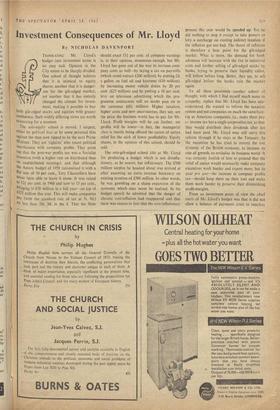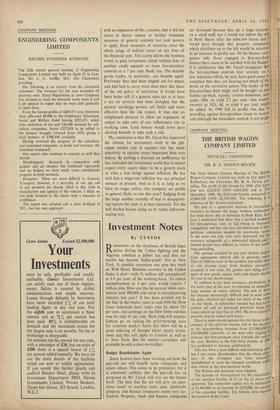Investment Consequences of Mr. Lloyd
By. NICHOLAS DAVENPORT
TRANSLATING Mr. Lloyd's budget into investment terms is no easy task. Opinion in the City seems to be sharply divided. One school of thought believes that it, is inimical to equity shares; another that it is danger- aus for the gilt-edged market; yet another that it has entirely changed the climate for invest- ment, making it possible to buy both gilt-edged stocks and equities with greater confidence. Such widely differing views are worth examining for a moment.
The anti-equity school is moved, I suspect, either by political bias or by some personal bias against the man now tipped to be the next Prime Minister. They are 'rightists' who resent political interference with company profits. They point out that the post-war profits tax was a Socialist invention (with a higher rate on distributed than on undistributed earnings), and that although the Amory budget of 1958 rationalised it with a fiat rate of 10 per cent., Tory Chancellors have never been able to leave it alone. It was raised to 121 per cent. in 1960 and now to 15 per cent., bringing in £70 million in a full year—on top of £325 million this year. This will make companies Pay (with the standard rate of tax at 7s. 9d.) no less than 10s. 9d. in the £. That the State should exact 53i per cent. of company earnings is, in their opinion, monstrous enough, but Mr. Lloyd has gone out of his way to increase com- pany costs as well—by laying a tax on pay-rolls (which could extract £200 million), by putting 2d. a gallon on fuel oil and kerosene (£50 million), by increasing motor vehicle duties by 20 per cent (£25 million) and by putting a 10 per cent. levy on television advertising which the pro- gramme contractors will no doubt pass on to the customer (£81 million). Higher taxation, higher costs and new uncertainties, they say, arc the price the business world has to pay for Mr. Lloyd. Profit margins will be cut further, net profits will be lower—in fact, the managerial class is merely being offered the carrot of surtax relief for the stick of lower profitability. Equity shares, in the opinion of this school, should be sold.
The anti-gilt-edged school tilts at Mr. Lloyd for producing a budget which is not disinfla- tionary, as he asserts, but inflationary. The £500 million surplus he boasted about was arrived at after assuming an extra revenue buoyancy on existing taxation of £506 million. In other words, he was gambling on a sharp expansion of the economy which may never be realised. In his budget speech he admitted that the danger of chronic cost-inflation had reappeared and that there was reason to fear that the cost-inflationary process this year would be speeded up. Yet he did nothing to stop it except to take powers to levy a surcharge on existing indirect taxation if the inflation got too bad. The threat of inflation is therefore a bear point for the gilt-edged market. What is more, the demand for bank advances will increase with the rise in industrial costs and further selling of gilt-edged stocks by banks, trying to preserve their liquidity ratios, will follow before long. Better, they say, to sell gilt-edged before the banks ruin the market again.
To all these pessimists another school of thought, with which I find myself much more in sympathy, replies that Mr. Lloyd has been mis- understood. He wanted to reform the taxation system and put companies on much the same foot- ing as American companies, i.e., make them pay ra• income tax but a single corporation tax, so that they would distribute their dividends after tax had been paid. Mr. Lloyd may still carry this reform through if he stays at the Treasury. In the meantime he has tried to restore the lost dynamic of the British economy, to increase its rate of growth, to revitalise its business world. It was certainly foolish of him to pretend that the relief of surtax would necessarily make company executives work harder and export more, but its quid pro quo—the increase in company profits tax—should keep them on their toes and make them work harder to preserve their diminishing profit-margins.
From an investment point of view the chief merit of Mr. Lloyd's budget was that it did not allow a balance of payments crisis to interfere with an expansion of the czonomy, that it did not resort to dearer money or further monetary measures of general restraint but took powers to apply fiscal measures of restraint—over the whole range of indirect taxes—at any time of the financial year. This surely allows the business world to plan investment ahead without fear of another credit squeeze or more hire-purchase controls or a 7 per cent. Bank rate. The durable goods trades, in particular, can breathe agairi. Previously they had been singled out for attack and had had to carry more than their fair share of the old policy of restriction. It would have been better still if a general sales tax or at least a tax on services had been included, but the present surcharge 'powers are fairer and more effective than the old system. It was also an enlightened decision to allow an expansion of output to take care of any inflationary rise in working costs. Lord Amory would never have allowed himself to take such a risk.
My conclusion is that Mr. Lloyd has improved the climate for investment—both in the gilt- edged market and in equities—but has made selectivity in equities more important than ever before. By putting a discount on inefficiency he has reminded the investment world that it cannot expect every equity share to be a growth stock or even a true hedge against inflation. He has said that a wage-cost inflation was our principal menace at present. And so it is as long as we have no wages policy. Are company net profits in general likely to rise this year? Judging from the large number recently, of bad or disappoint- ing reports the issue is at best uncertain. Yet the bull market booms along on its rashly indiscrim- inating way.















































 Previous page
Previous page